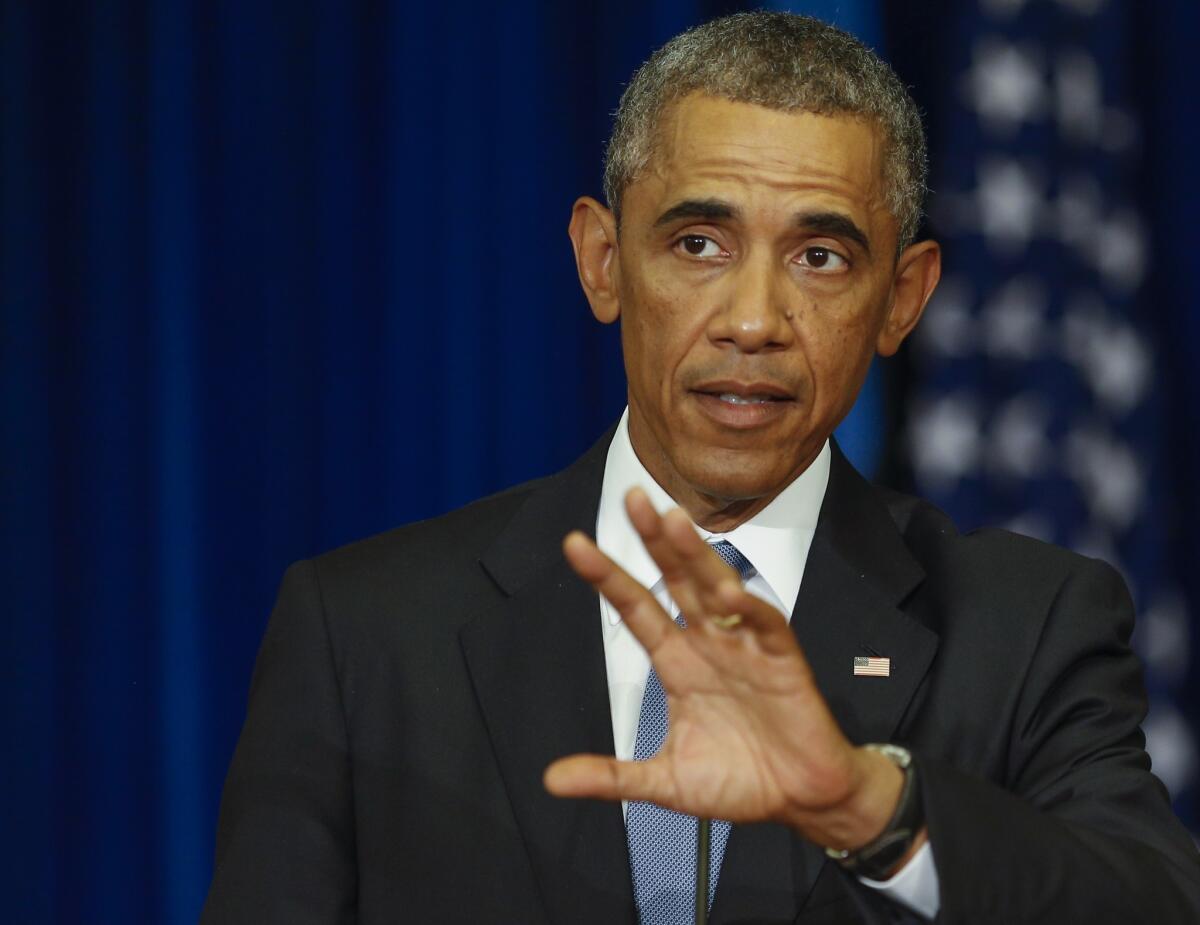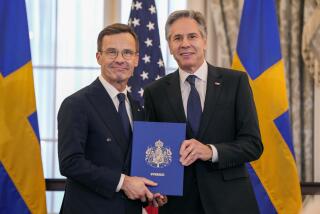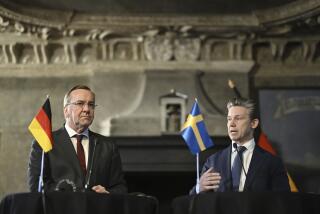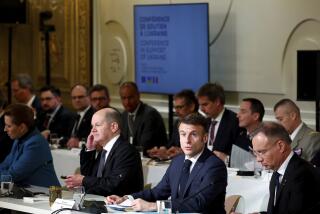Obama reassures Baltic allies of NATO support amid Ukraine conflict

President Obama offered reassurance and military might to Estonia and the other Baltic nations on Wednesday, promising to thwart Russia’s “dark tactics” and territorial ambitions should they spread from Ukraine to those NATO allies to the north.
At a daylong stopover before a NATO summit, Obama declared that the alliance would protect some of its newest members, the Baltic states of Estonia, Latvia and Lithuania, from what he described as bullying from Moscow. Obama previewed NATO’s plans to back up its reassurances with a new commitment of several thousand additional troops to be rotated through the region. Estonia and Latvia share a border with Russia, and all three countries were once Soviet states.
“We’ll be here for Estonia. We’ll be here for Latvia. We’ll be here for Lithuania. You lost your independence once before. With NATO, you’ll never lose it again,” Obama told an audience of students and young professionals at a concert hall in this capital city on the Baltic Sea. “The defense of Tallinn and Riga and Vilnius is just as important as the defense of Berlin and Paris and London.”
The president’s gestures of alliance were similar to reassurances and promises of increased military presence he made to Poland this spring, and there remained little new in the West’s strategy for confronting Moscow in the months since it annexed Crimea from Ukraine and backed separatist militias in the eastern part of the country.
France’s president did announce later Wednesday that the country is suspending delivery of a warship to Russia, saying in a statement that Russia’s escalating aggression in Ukraine harms “the foundations of security in Europe,” according to the Associated Press. Allies had pressed for the move for months, but the French president, Francois Hollande, had said that nixing the deal would be too expensive.
Obama was due to meet with allies this week as Europe finalized another round of fresh economic penalties against Russia, which has shown only fleeting signs of shifting course despite a steady chain of sanctions.
One such sign came and went as Obama arrived in Estonia on Wednesday. As he met with Estonian President Toomas Hendrik Ilves in the morning, Ukraine President Petro Poroshenko announced he had reached a cease-fire agreement with Moscow. Both Obama and Ilves emerged from the meeting to offer little hope for the still-unconfirmed deal. Obama noted several similar agreements crumble almost instantly. “I hope it last,” Ilves noted warily.
Within a couple of hours, Poroshenko’s office retracted the announcement.
Ilves’ skepticism reflected his country’s keen sensitivity to Russian aggression. Estonia — a small, strategic outpost jutting into the Baltic Sea — has for centuries lived under the imposing shadow of its eastern neighbor. After more than four decades of Soviet control in Estonia, the last of the Russian Army soldiers left just 20 years ago.
In his speech at a gleaming, modern Nordea Concert Hall, Obama recalled Estonia’s struggle for independence and declared Russia’s moves in Ukraine a step backward.
“We’ve made historic progress towards the vision we share — a Europe that is whole and free and at peace,” he said. “As we gather here today, we know that this vision is threatened by Russia’s aggression against Ukraine.”
Since declaring its independence, Estonia has sought security in Western alliances and prosperity in high-tech start-ups and a wired culture. (“I should have called the Estonians when we were setting up our healthcare website,” Obama joked.)
Estonia joined NATO in 2004, along with its Baltic neighbors Lithuania and Latvia. The president met with all three nations’ leaders. But the president held Estonia up as a model for contributing its share to NATO, which has struggled to get members to meet their targets for defense spending.
Estonia, a nation of just 1.3 million people, “truly punches above its weight,” Obama said.
In the wake of the conflict in Ukraine, Ilves has sought a permanent NATO presence in Estonia, a move that other allies have rejected so far amid concerns that it would further heighten tensions between Moscow and the West. Under a series of agreements, NATO leaders have kept permanent bases out of front-line nations.
But the announcement of a new Readiness Action Plan has begun to test the limits of those agreements. The plan calls for ramped-up rotation of NATO forces through Baltic nations, a system some described as de facto permanent bases that could allow rapid responses to quieter, small-scale incursions of modern-day border disputes.
Ilves argued Wednesday that Moscow’s aggression in Ukraine, although it is not a NATO ally, has changed the security situation and should prompt a rethinking of those previous agreements.
“This is an unforeseen and new security environment,” Ilves said in English. He is the child of refugees, was raised in New Jersey and went to college and graduate school in the U.S.
Obama agreed that the “circumstances have changed” and added that previous assumptions should be looked at “with fresh eyes,” but committed only to discussing the topic with other NATO leaders at their meeting in Wales.
More to Read
Start your day right
Sign up for Essential California for news, features and recommendations from the L.A. Times and beyond in your inbox six days a week.
You may occasionally receive promotional content from the Los Angeles Times.






